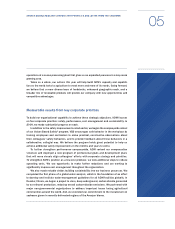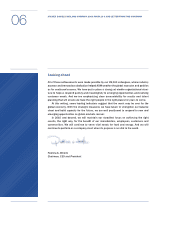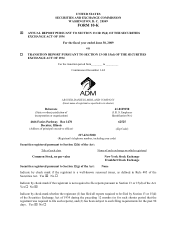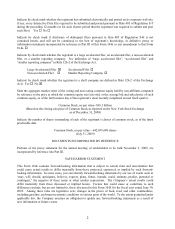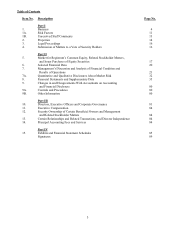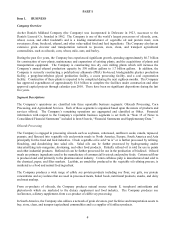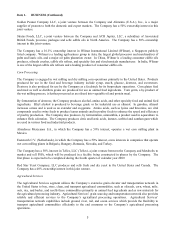Archer Daniels Midland 2009 Annual Report Download - page 15
Download and view the complete annual report
Please find page 15 of the 2009 Archer Daniels Midland annual report below. You can navigate through the pages in the report by either clicking on the pages listed below, or by using the keyword search tool below to find specific information within the annual report.9
Item 1.
BUSINESS (Continued)
Research and Development Expenditures
The Company’s research and development expenditures are focused on developing food, feed, fuel, and industrial
products from renewable agricultural crops and improving processing efficiency.
The Company maintains a research laboratory in Decatur, Illinois, where product and process development
activities are conducted. Activities at Decatur include the development of new bioproducts and the improvement of
existing bioproducts by utilizing new microbial strains that are developed using classical mutation and genetic
engineering. Protein and vegetable oil research is also conducted in Decatur where bakery, meat and dairy pilot
plants support food ingredient research. Vegetable oil research is also conducted in Hamburg, Germany; Erith,
UK; and Arras, France. Research to support sales and development for flour and bakery products is performed in
Overland Park, Kansas. Sales and development support for cocoa and chocolate products is performed in
Milwaukee, Wisconsin, and Koog aan de Zaan, the Netherlands. Research and technical support for industrial and
food wheat starch applications is conducted in Montreal, Canada.
The Company uses technical service representatives to interact with customers to understand the customers’
product needs. These technical service representatives then interact with researchers who are familiar with the
Company’s wide range of food, feed, fuel, and industrial products as well as applications technology. These
individuals form quick-acting teams to develop solutions to customer needs.
The Company will be completing work on a cooperative research and development agreement with Pacific
Northwest National Laboratory which focuses on hydrothermal liquefaction of biomass to biocrude oils. This
agreement is part of the effort being undertaken to support a joint development project with ConocoPhillips.
The Company is continuing work on a grant awarded by the Department of Energy to develop yeasts capable of
fermenting five-carbon sugars, which is a key technology for producing ethanol from lignocellulosic biomass.
The Company is working with Purdue University on this project.
The Company’s biodiesel research is focused on cost, product quality, and alternative feed stocks. Several new
technologies have been developed to minimize the chemical input costs for biodiesel production while
simultaneously reducing waste streams and improving yield. Selected technologies are being deployed in the
Company’s current biodiesel production facilities to reduce costs and improve quality.
The Company has entered into a joint development agreement with John Deere and Monsanto to evaluate the
sustainable collection, storage and transportation of corn stover – the stalks, cobs and leaves of the corn plant left
after combine harvesting. The insights from this research will help the Company understand the potential of
corn stover as a biomass feedstock for advanced biofuels.
The amounts spent during the three years ended June 30, 2009, 2008 and 2007 for such technical efforts were
approximately $50 million, $49 million, and $45 million, respectively.
Environmental Compliance
During the year ended June 30, 2009, $117 million was spent for equipment, facilities, and programs for pollution
control and compliance with the requirements of various environmental agencies.
There have been no material effects upon the earnings and competitive position of the Company resulting from
compliance with federal, state, and local laws or regulations enacted or adopted relating to the protection of the
environment.


